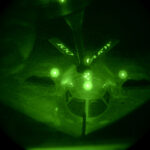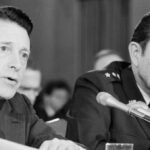
Stress may undermine performance and decision-making at the strategic level by degrading problem-solving, impairing cognition, increasing reaction times, and narrowing attention to detail.
Leadership today is fraught with challenges: stress, distraction, and the constant demand to multitask. Everything feels like a priority! Military leaders, in particular, are perpetually accessible and are expected to respond immediately to emails, texts, calls, and social media notifications. Always “being on” in our increasingly complex strategic environment can take a significant cognitive toll on leaders and can lead to excessive stress, burnout, and decision paralysis. Unless adequately managed—through task/interface development, intentional skill development, and internal regulation—the increased cognitive burden from work, home, and daily life management may result in poor performance, increased errors, and personal stress.
Stress may undermine performance and decision-making at the strategic level by degrading problem-solving, impairing cognition, increasing reaction times, and narrowing attention to detail. While the consequences of degraded performance are problematic at the individual level, senior leaders’ poor attentional fitness has profound consequences at the organizational or strategic levels because degraded leader performance can impact whole organizations. Yet, professional military education (PME) often overlooks this dimension of mental fitness and strategic leadership, rarely allocating the time or space required to fully equip current and future strategic leaders with the tools to optimize their cognitive capacity.
Recognizing this gap in PME, and after repeatedly hearing U.S. Army War College (USAWC) students’ stories of cognitive overload in the joint force, we designed a course grounded in basic neuroscience to equip leaders with the tools and practices they need to enhance their mental fitness, ensuring they can use attentional fitness to navigate the cognitive and emotional demands of the complex, high-stakes environments that characterize the contemporary strategic environment. In this article, we argue that the cognitive demands on senior leaders are intensifying, and that PME must incorporate training in attentional fitness to ensure the success of our next generation of strategic leaders. We outline the rationale, structure, and early impact of a new neuroscience-informed elective designed to help military leaders enhance attentional control, manage stress, and improve decision-making under pressure.
Basic Neuroscience of Attention
Although this article is not intended as a deep dive into brain science, a basic understanding of the neuroscience of attention is essential for leaders and individuals to understand how and why people may react the way they do. The brain is hardwired to prioritize survival, which means that when we perceive a threat, our focus and attention shift automatically to address the potential danger. When attention shifts involuntarily as part of the fight-flight-freeze response, it significantly impairs our ability to concentrate on tasks unrelated to immediate survival. For example, when faced with a physical threat, our energy and attention are redirected to either confront the threat, freeze to remain concealed, or flee to escape. This response happens subconsciously because humans generally cannot control this reaction. Although this survival mechanism was critical when tigers chased our ancestors, it is less necessary in most modern societies. Interestingly, our brains often struggle to differentiate between real and imagined threats and can respond to digital interactions as if they are threats, triggering maladaptive reactions such as depression and anxiety. Hyperarousal may also be crucial in combat, but the response can be counterproductive in today’s hyperconnected world, where distractions—like digital notifications—constantly interfere with our brain’s attention systems.
Even more problematic than the subconscious stress caused by constant notifications is our voluntary decision to shift attention toward them. In the absence of threats, the brain focuses attention. We create cognitive problems for ourselves when we choose to switch between tasks, between threats and tasks, or between multiple real/perceived threats. Task switching, commonly and mistakenly called multitasking (human brains cannot multitask), is more pronounced in the digital age. Individuals “who regularly engage in multiple forms of media use are worse at or take longer to respond to tasks with salient distractors, possibly due to difficulties ignoring irrelevant stimuli” (Rizky et al, pp.9). Improperly managed, digital interruptions cause us to lose focus by forcing a task shift that interrupts our critical thinking ability. Incessant text or email notifications interfere with our ability to focus and often derail our ability to forecast, think critically, or task shift. Additionally, the perceived need to respond immediately blurs the boundaries between work and personal time, effectively prolonging the workday and reducing the mental downtime needed for rest, reflection, and recovery.
Since our brains are designed to be distractible, attention cannot simply be willed into existence. Digital self-control interventions are ineffective at regulating distractibility. Consequently, leaders must cultivate attentional strength through deliberate practice to be able to manage distractions and mitigate the impact of stress. Brain exercises can act as mental push-ups to strengthen and lengthen the ability to focus attention, decrease reactivity, and improve overall performance.
Enhancing Focus Through Brain Exercise
Mindfulness practice has gained significant attention in military and civilian audiences in recent years due to its numerous benefits for overall well-being, but until recently mindfulness practice had not been part of the Carlisle experience at the USAWC. In 2024, we developed and launched Peak Mind: Brain Health and the Power of Paying Attention, a mindfulness-based attentional fitness course for USAWC students. The course, designed for senior military leaders, included a 6-week online elective course followed by a 2-day in-person workshop as part of the Department of Distance Education (DDE) electives program. Forty students volunteered for Peak Mind in 2024, and 31 students enrolled for 2025, reflecting 10% and 9% of each class. This is a tremendous voluntary investment of time into attentional fitness by future strategic leaders, an indicator of the demand for dedicated mindfulness training among today’s senior military leaders.
We designed the course around the work of Dr. Amishi Jha, a neuroscientist at the University of Miami who has worked with us on past projects. We took inspiration from Dr. Jha’s book and grounded the curriculum in the neuroscience of stress and attention (i.e., sympathetic and parasympathetic nervous systems), emphasizing stress management, attentional control, and emotional regulation. On that foundation, students explored how their environment might overwhelm their instincts and inhibit peak performance. Students engaged with weekly readings, participated in weekly synchronous video sessions with faculty and classmates, conducted daily 12-minute mindfulness practices, and wrote weekly journal reflections.
While further qualitative analysis is forthcoming, the student reflections on Peak Mind indicateseveral key themes: leadership authenticity, the role of mindfulness and emotional regulation, resilience, and well-being.
Course Findings: Leadership, Attention, and Resilience
We conducted an initial thematic analysis of the student discussion posts and journal entries after the first course iteration to assess the impact of the course, to identify themes in their entries, and gain understanding of their progression during the six-week course. We obtained permission from students to report on and quote their experiences. While further qualitative analysis is forthcoming, the student reflections on Peak Mind indicateseveral key themes: leadership authenticity, the role of mindfulness and emotional regulation, resilience, and well-being.
First, student reflections indicated that mindful training could be beneficial for authentic leadership—staying true to their values rather than merely adopting prescribed leadership styles or behaviors. For example, “authentic leadership emphasizes a ‘way of being’ that creates space for an individual to strengthen and use their core attributes as a leader.” Another noted that “senior leaders require an extra dose of awareness, courage, empathy, and vision, all of which are difficult to measure and capture in annual reports,” indicating that current performance metrics miss key components of leadership.
Second, students reported that mindfulness practices helped them better manage stress and enhanced their emotional regulation. In particular, “one of the benefits of this course is that I’ve achieved better and more restful sleep through mindfulness, and less anxiety and more stable emotions.” They also noted that their personal experiences with mindfulness, particularly in high-stress situations, helped them to be better leaders by improving their focus, patience, and emotional resilience. Key examples include, “understanding that task switching is terrible for performance, accuracy, and mood, I will better prioritize tasks to ensure my subordinates, and I can focus entirely on the things that matter most,” and “I find myself to be more patient with others’ mistakes, more focused during conversations, and more willing to silence the various distractions in my life to focus on one thing, person, or task at a time–deliberately.”
Third, student reflections suggest that mindfulness practice can have practical benefits for leaders by helping leaders foster a calm and focused approach to challenges. One student noted: “Through the course material and daily practices, I have learned to better identify stressors and how to manage them. I have more appreciation for the wisdom of remaining calm, which should enhance my decision-making and emotional intelligence…. This awareness has allowed me to observe my thoughts and feelings without getting overwhelmed, providing a mental space that helps me handle life’s stresses more effectively.“
Finally, the resilience theme, particularly in dealing with personal and professional challenges, permeated student discussions. Conversations revealed how mindfulness and emotional awareness contributed to resilience, allowing leaders to mediate stress and setbacks. “I believe by consciously trying to improve my attention I can better be in control of choosing how I respond to [negative] feelings, and, in turn, how well I can develop subordinates, even in stressful situations.” There was also a notable focus on well-being, not just for the leaders themselves but also for their teams, suggesting an integrated approach to leadership that prioritizes the mental and emotional health of all members. “Mindfulness may mitigate some risks and help leaders to recognize Soldiers degrees of resilience, stressors, and awareness, as well as their own.”
Overcoming Skepticism
We anticipated initial resistance to the daily mindfulness practice, due to the students’ demanding schedules and a self-identified failure to prioritize their own health and well-being. However, by the end of the six-week course, our students’ journal entries reflected a significant shift in their attitudes toward mindfulness. Skepticism gave way to a widespread recognition of mindfulness’s benefit for both leadership and personal health. Many students noted an increased focus on self-care and cognitive well-being.
“The course was a refreshing and insightful exploration of mental processes involved with leadership. The elective should be provided as a core requirement (and as part of all PME/CES development programs)—mindfulness can have [a] profound effect on leadership and decision-making effectiveness.”
Moving Forward
Seventy-nine percent of our students from the first iteration of the course reported being very satisfied with Peak Mind and 21% reported being satisfied in our post-course surveys. Students clearly valued the Peak Mind elective, with many insisting mindfulness training should be a required part of PME. We are already reading similar sentiments in the student journals from our second iteration of this course, currently in its second week.
“Overall, [I am] extremely satisfied with this course…. I am on the path to be a mindful warrior. This should be a requirement for all students as part of the core curriculum. The Army focuses on peak physical fitness but there are zero courses in any of the other officer professional education tracks that support a peak mind.”
While this feedback is encouraging, future course iterations and longitudinal USAWC alumni surveys, including quantitative metric analysis of mindfulness practice data and pre-post course assessments, will provide insights into the long-term benefits of mindfulness for senior leaders. At a minimum, the cognitive challenges of our current strategic environment demand that current and future leaders explore ways to tend to their attentional fitness—the ability to filter digital distractions, maintain focus, and create mental space for critical thinking.
Kelly RM Ihme, PhD, is a lieutenant colonel and Intelligence Officer for the PA ANG and an Assistant Professor in the Department of Distance Education at the U.S. Army War College. She is a board-certified psychiatric nurse with a PhD in Organization Development and Leadership Psychology from the University of Arizona. Her main research areas are mindfulness, cyber defense, and behavioral health as they intersect with national defense.
Maurice Sipos, PhD, is a Professor in the Department of Command, Leadership, and Management at the U.S. Army War College and directs the Strategic Leader Assessment and Development Program. He is a retired U.S. Army colonel. He earned his Bachelors, Masters and PhD in Psychology from Lehigh University and is a graduate of the AY17 Resident course at the U.S. Army War College.
The views expressed in this article are those of the author and do not necessarily reflect those of the U.S. Army War College, the U.S. Army, or the Department of Defense.
Photo Credit: Freepik





Professor Cahill’s reflections on the “present leader” really hit home – reminds us all leadership isn’t just *what* you do, but intensely about *how* you show up for your team and your mission. This piece provides great framing by discussing the importance of self awareness, so do you think there will be more courses taught using these concepts?
I found the point about proactive calendaring incredibly relatable. As a leader in this always-connected world, blocking out time to genuinely think and strategize is so crucial. Does anyone else find dedicated focus time boosts their effectiveness exponentially?
That was a really thought-provoking article! It really highlighted how easily leaders, just like anyone else, can slip into a distracted mode, but with far greater impact. Understanding those pull-factors and focusing on mindfulness as leaders feels vital for ethical decision-making. How do you all actively combat distractions in high-pressure environments?